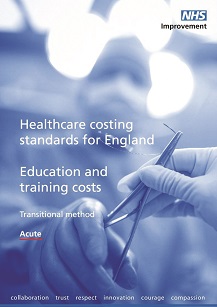Technical review - March 2018
The HFMA has updated its briefing, Reporting on environmental sustainability to cover changes and latest guidance for 2017/18.It identifies the sources that require NHS bodies to report their environmental impact and their progress on climate change targets. In particular, it looks at requirements and guidance in the NHS standard contract, the Department of Health and Social Care’s Group accounting manual and NHS Improvement’s Annual reporting manual for foundation trusts. It also looks at where the Department’s environmental reporting duties arise.
A change in rules last October mean it is now mandatory to collect payment upfront from any chargeable patient that is not in need of urgent or emergency care. New guidance from NHS Improvement and NHS England – Improving systems for cost recovery for overseas visitors – explains how changed risk-share arrangements now operate and how they should be accounted for and the actions expected of providers and commissioners. Although initial guidance was published in 2015, the new visitor cost recovery guidance reflects subsequent changes. In particular new regulations now require providers to make and collect an initial estimate of the whole cost of the care or treatment before the care begins. Chargeable visitors from non-European Economic Area countries should be charged 150% of tariff prices.
The HFMA has published an updated version of its Audit committee handbook. Last published in 2014, the new edition takes account of key changes in the NHS in recent years. In particular, a new chapter covers the implications of partnership working at scale. The handbook explores the most common new arrangements – alliances of providers working together, clinical commissioning group committees in common and shared back office arrangements – and looks at how the audit committee should approach them and their associated risk. It also looks at the broader governance implications of system working. The new guide was due to be published towards the end of February.
NHS Improvement confirmed that it will not be collecting education and training costs this year and has published a transitional method for 2017/18 for netting off education and training income from both patient-level costs and reference costs. The guidance should be used by acute early implementers of the new patient-level costing approach being implemented as part of the Costing Transformation Programme (CTP). Education and training costing standards are due to be published in March for use in a pilot collection. February also saw NHS Improvement announce that submitting patient-level costs for acute activity would be mandatory from the 2018/19 costing year – although trusts will be given time to achieve full compliance. New costing standards for the 2018 collection (for 2017/18) were published in the month for acute (final) and ambulance (draft) providers. Mental health and community standards will be published in the spring.
Clinical commissioning groups that have been set a deficit control total will be eligible for allocations from the new £400m commissioner sustainability fund (CSF) – with the value set to bring the CCG back to in-year financial balance. According to details issued alongside the refreshed planning guidance, control totals have been set with an expectation that an overspending CCG will reduce its rate of expenditure by at least 1% of allocation. Those with longstanding cumulative deficits will have to make faster improvements. Where a CCG’s risk-adjusted forecast outturn for 2017/18 deteriorates after month 9, the control total may be adjusted to recoup some or all of the further deterioration.
Related content
The Institute’s annual costing conference provides the NHS with the latest developments and guidance in NHS costing.
The value masterclass shares examples of organisations and systems that have pursued a value-driven approach and the results they have achieved.